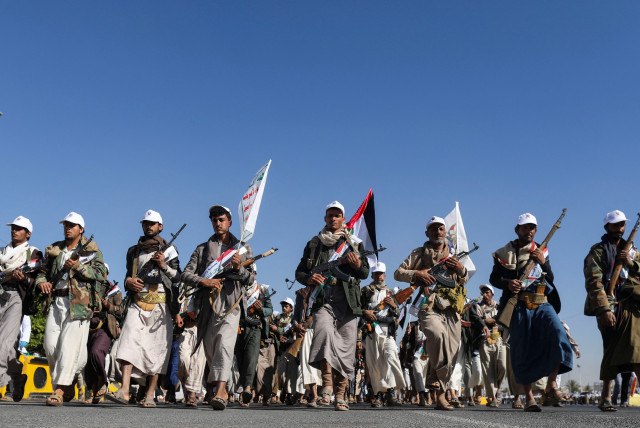The ongoing Houthi threat requires immediate preparedness - opinion

Israel must intensify intelligence gathering in Yemen, gaining a thorough understanding of the Houthis’ economic structure, the smuggling routes from Iran.
On the morning of September 16, Israel awoke to the sound of sirens triggered by a surface-to-surface missile launched from Yemen.
The attack was in line with the Houthis’ promise to avenge Israel’s airstrike on Hodeidah port, their primary economic and military lifeline.
However, the fact is that the Houthis have been attacking Israel since the start of the war and would have attacked Israel even without the strike in Hodeidah. The launch, therefore, serves as a critical reminder of the severity of the Houthi threat and the urgent need to address it.
The Houthis have repeatedly stated that they are not merely Iran’s proxy. Nevertheless, they are extensively supported by Iran, both militarily and financially, and have absorbed key elements of former ayatollah Ruhollah Khomeini’s ideological doctrine. Iran provides them with guidance, diverse training, and support.
The Saudis, who have experienced firsthand the Houthis’ enhanced capabilities since 2015, failed to defeat them in the war they started that year.
The Houthis have worn the Saudis down with missile attacks on key oil industry hubs in Saudi Arabia and even toward Mecca, the kingdom’s third-largest city and Islam’s holiest site.
Now, after years of Iran’s military industry testing its capabilities against Saudi Arabia through the Houthis, they are being directed at Israel.
In addition to the long-range threat posed by the Houthis as demonstrated by the 2,000 km. missile launch, the Houthis are also working on shortening the distance by attacking Israel from its borders.
Alarming reports from recent days
In recent days, reports – particularly from the Syrian and Yemeni opposition – indicate that a group of some 50 Houthi missile specialists arrived in southern Syria last week, transported by Iran’s Islamic Revolutionary Guard Corps (IRGC) and the Syrian army – to carry out attacks against Israel.
The Syrian front is not foreign to the Houthis. During the Syrian civil war, Houthis were brought in by then-Quds Force Commander Qassem Soleimani of the IRGC to fight Bashar Al-Assad’s opponents as part of their combat training.
This was part of Iran’s broader initiative to upgrade various components of the “Resistance Axis” and improve the terrorist threat posed by Iran against Saudi Arabia, the United States, and Israel in the Red Sea arena. Accordingly, reports emerged about Houthi operatives killed in battles in Syria.
The mobility of the Iran-led Resistance Axis is a well-known and critical characteristic. During the early stages of the Iran-Iraq war, Hezbollah operatives participated in Iran’s war effort, as did, to some extent, members of AMAL (due to their connections with Iranian Defense Minister Mustafa Chamran, who previously held a senior position in AMAL before the Islamic Revolution).
Upon orders from Ayatollah Ali Khamenei, Hezbollah operatives were also sent to Iraq during the Iraq War (2003–2011) to lead attacks by Iraqi Shi’ite militias against US forces. Various Iraqi Shiite militias, such as Asa’ib Ahl al-Haq and the Badr Organization, were sent by Iran to the Syrian Civil War to support Assad’s survival.
The Afghan Fatemiyoun militia, backed by the Quds Force and active in Syria, was dispatched to Yemen to assist the Houthi effort, alongside Hezbollah operatives sent by Iran to train the Houthis directly.
Israel is currently facing a significant, multi-front challenge, with the main components being threats from Gaza and Lebanon, while simultaneously addressing the developing threat in Judea and Samaria, once again under Iran’s auspices, through counterterrorism operations mainly in the Jenin and Tulkarm areas.
The Iranian player is involved across the entire region, nurturing and fostering the Resistance Axis organizations, while still vowing to fulfill Khamenei’s promise to avenge the killing of Hamas’ political bureau chief, Ismail Haniyeh.
The missile launch from Yemen and the Houthis’ preparations to attack Israel from the Syrian border make it clear that Israel cannot wait to address the Houthi threat until the battles on other fronts are over.
What Israel needs to do to minimize Houthi threat
Israel must allocate intelligence and military resources to minimize the Houthi threat as much as possible.
As part of this effort, Israel should continue conducting airstrikes against them, targeting both their military, human, and economic infrastructures.
To do so, Israel must intensify intelligence gathering in Yemen, gaining a thorough understanding of the Houthis’ economic structure, the smuggling routes from Iran, and Iranian assets in this region, as well as the military infrastructure used by the Houthi leadership.
This would enable Israel to deal a significant blow to both the Houthis and Iran in this arena.
The writer is a researcher of Iran, Hezbollah, and Shi’ite militias, at the Misgav Institute for National Security and Zionist Strategy.
Jerusalem Post Store
`; document.getElementById("linkPremium").innerHTML = cont; var divWithLink = document.getElementById("premium-link"); if (divWithLink !== null && divWithLink !== 'undefined') { divWithLink.style.border = "solid 1px #cb0f3e"; divWithLink.style.textAlign = "center"; divWithLink.style.marginBottom = "15px"; divWithLink.style.marginTop = "15px"; divWithLink.style.width = "100%"; divWithLink.style.backgroundColor = "#122952"; divWithLink.style.color = "#ffffff"; divWithLink.style.lineHeight = "1.5"; } } (function (v, i) { });

